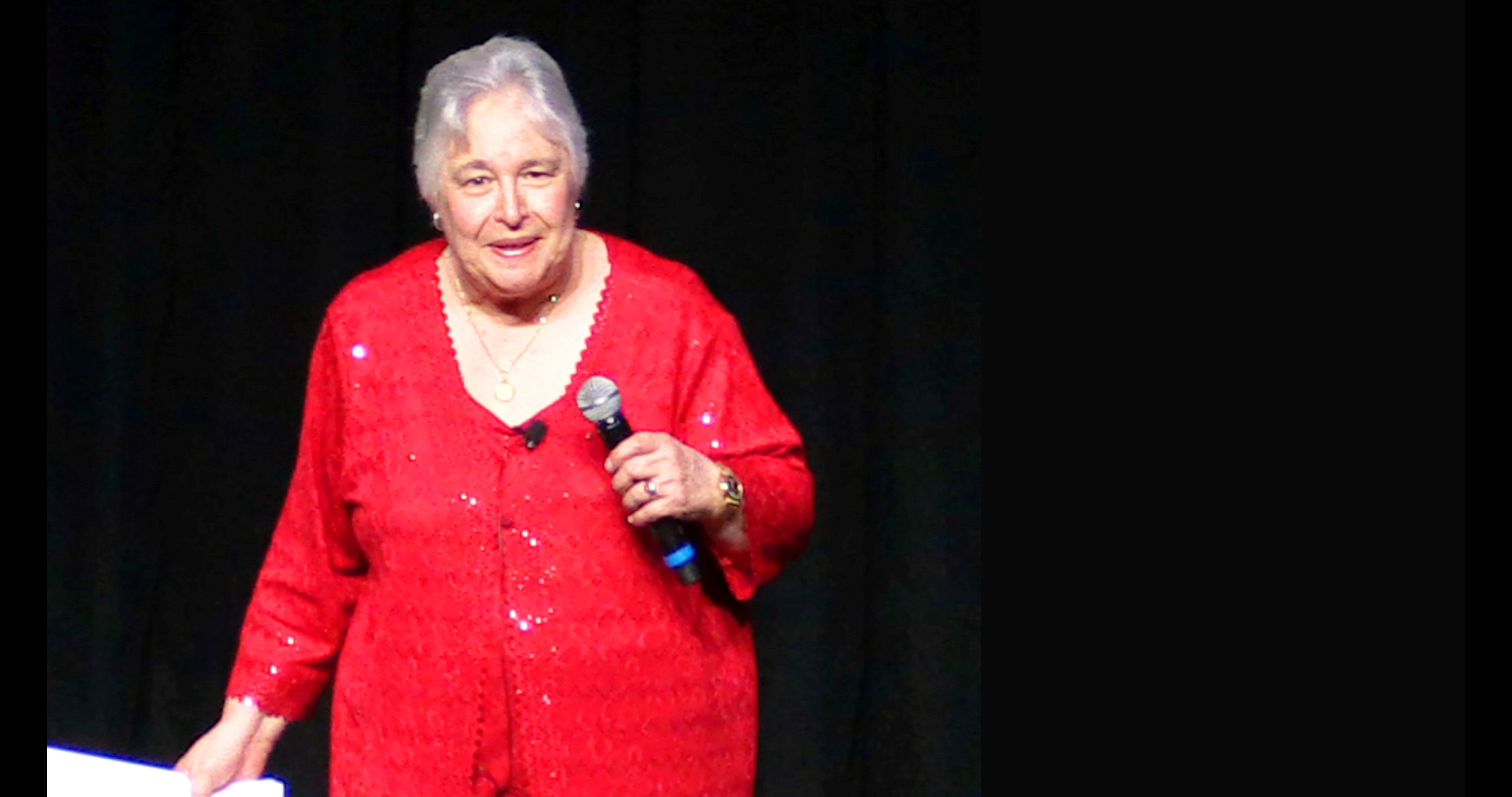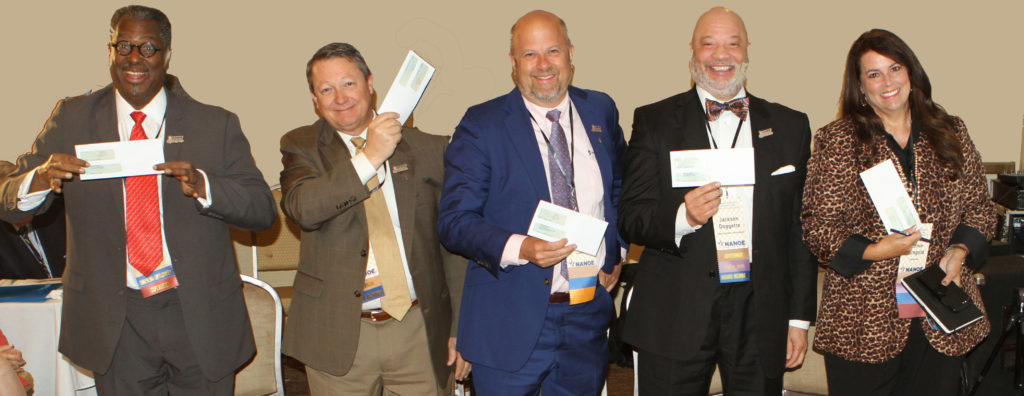
New Guidelines for Nonprofits by Kathleen Robinson & Jimmy LaRose
April 6, 2019Legacy Gifts: What They Are and How to Get Them
April 9, 20196 Reasons To Pay Board Members

Pay Board Members? Last week, with great fanfare and applause, NANOE honored their Board Members with financial compensation for their service to the charitable sector. NANOE’s president, Louis Fawcett, issued checks in the amount of $1,000 for their board meeting held during NANOE’s Convention & Expo in Charleston, SC. During his presentation Fawcett posed the question, “You may not pay your board members but if you did…WHICH ONES WOULD YOU KEEP?”
The crowd responded with both laughter and delight.
Jack Horak, of the TANGO Alliance was in attendance, and shared, “This is a sweeping reversal of sector orthodoxy — which presupposes that directors donate both their time and their money to the organizations they serve. Consequently, it’s no surprise that some of the more prominent sector voices were quick to dismiss NANOE’s message. NANOE’s paradigm turns conventional wisdom on its head so criticism in defense of the status quo is expected. However, after nearly 40 years as a legal and business advisor in the sector, I respectfully disagree with NANOE’s critics. I suggest that if they take their analysis to a deeper and broader level they will find considerable insight in NANOE’s suggestion, and perhaps conclude, as I have, that the paid professional board model may be the optimal choice for some, but not all, organizations.”
NANOE pays their board members $1,000 a day for in-person meetings, plus travel reimbursement, and $300 an hour for board meetings held by phone.

The Center for Association Leadership makes the point, “Although not the norm, compensating board members is legal in many circumstances and may be beneficial to the organization. If you’re considering this configuration check your by-laws and State requirements.”
Here’s 6 Reason Why Charities Should Pay Board Members:
- Compensation promotes professionalism rather than amateurism.
- Compensation attracts the most qualified and able individuals.
- Compensation awards, in a tangible way, valuable personal time and contributions made for the cause.
- Compensation promotes more risk taking.
- Compensation stimulates better attendance at board and committee meetings.
- Compensation holds board members more accountable for performance.
If You Pay Board Members, Consider These Tips:
- Establish policies with clear objectives, and indicate how compensating the board of directors will benefit the organization.
- Determine what compensation is considered reasonable, and review the compensation regularly.
- Determine which board members will be compensated (the chair, board officers, or all board members).
- Determine how the compensation will be structured (i.e., flat fee, retainer, per diem, formula), how it will be distributed, and the tax implications.
- Determine how much each board member will be compensated and whether the chair will be paid more than others.
- Careful attention to legal requirements and the details of any payment arrangements will ensure that nonprofits make informed decisions and set responsible policies for board compensation.
6 Reason Why Charities Should Pay Board Members was written by author, speaker and fundraiser James P. LaRose, CNE, CDE, CNC. He’s the author of RE-IMAGINING PHILANTHROPY: Charities Need Your Mind More Than Your Money™ written to philanthropists who give nonprofits what they really need…enterprise models that grow capacity and achieve financial sustainability.
Jimmy LaRose is also a contributing author at InsideCharity.org

7 Comments
I’ve served on many boards and have never been paid for my service. Pay could compromise the integrity of board members and make them less willing to take an unpopular stand.
It’s wonderful that you can offer your time without compensation. Congratulations for your economic success and thank you for choosing to serve your nonprofits without compensation. Realize that you are in the minority. Most Americans can not afford to work without compensation. Most people live hand to mouth, paycheck to paycheck, and need to maximize compensation for every hour of their labor. Those who are excluded from serving their community nonprofit organizations without compensation include most women and most minorities, those with lower levels of formal education. It is unethical, elitist and anti-social to refuse to compensate people in working class for their labor serving on non-profit boards. Those of us who focus our efforts on ESG progressive reforms are committed to seeing responsible nonprofit boards disavow the position you propose.
Considering how important the boards are to their respective charities, it seems only proper to offer some compensation. It is important that these organizations have the best possible leadership.
Realizing this post is old…. I can’t help but point out that many REALLY effective leaders that would like to support a cause with their board service would add “a #7” to the list of 6 reasons above to consider some compensation: These #7 people often are aware at some level of the opportunities they pass on professionally and regularly…. in service to a charity. Were I to add up the opportunity cost to myself ( let alone other board members ) in a given year, I cannot tell you how many thousands of dollars I did not make as a direct result… and yes, in fact, would have made. Not speculating. I’m a pro who knows what I make in salary and per hour. My family/life has a pretty conscientious but fixed minimum ‘overhead’ that I can’t get below… and when I turn away a business opportunity for a charity task at hand.. it’s real.
“Lost opportunity cost” is a loss of bill-paying income that I could have (theory) donated had I had time ( which I elected to use to support board or charity work ) to earn it. It’s a quandary. Of course there’s lost opportunity for anyone volunteering. We can’t all “walk away and donate more cash”.
I’d like to hear how different people tackle this.
I also agree that many who” most would like to” serve are both underrepresented minorities ( still ) and/or are those who simply cannot afford to work hours a week for free when their bills require: paying. No, not because they are not better with adjusting their priorities or budgets… so … thoughts? We are debating this now at one charity I volunteer for. Thx
We are in the business of recruiting outside directors for both For-Profit and Non-Profit organizations. In order to attract and retain THE most qualified candidates to the board, we believe it lonly logical that compensation be paid to ALL directors. Selected and serving directors always have the option to donate those payments back to the non-profit.
WOW JOE…GREAT POST. Would love to connect with like-minded experts (and also experts who disagree with us). Please email me at [email protected]
We would enjoy featuring you at Inside Charity!
per your request,